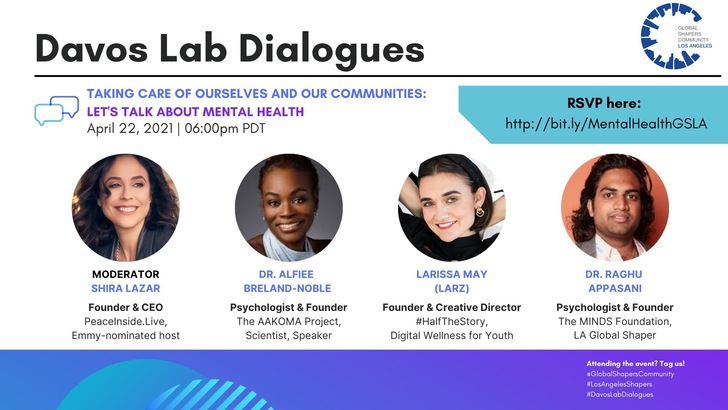With the global shutdown during the pandemic, we’ve seen the largest spike of mental health concerns across the US. In large part due to loneliness and isolation, we’ve seen alarming rates of children reporting suicidal thoughts and more adults feeling the troughs of a mental health crisis.
We often hear psychiatrists and mental health specialists encouraging us to open up about our mental health issues, however, we seldom have the opportunity to hear from them about their own well-being. In moments of social crisis, they are always called to action, but we need to remember that they also need support and unfortunately are not always able to find it. They are, after all, human.
The Global Shapers Los Angeles Hub, an initiative of the World Economic Forum, held a dialogue to shed light on mental health issues and discussed ways that we can collectively speak up on the issue of mental health, both at work and at home. The distinguished speakers who joined this session were
- Dr. Alfiee Breland-Noble, an internationally recognized scientist, author, speaker, media contributor, and founder of the AAKOMA Project;
- Larissa May (Larz), a global marketing guru and founder of Half the Story, a nonprofit dedicated to empowering the next generation’s relationship with social media;
- Dr. Raghu Appasani, a psychiatrist, neuroscientist, mental health advocate, and the founder and CEO of Minds Foundation, a mental health nonprofit.
- Shira Lazar (moderator), Founder, and CEO of the Emmy Nominated Digital Media Brand – What’s Trending, as well as Founder of the online wellness community PeaceInside.Live.
While discussing the burnout that mental health advocates experience, Dr. Alfiee said, “Because of what we’ve been dealing with over these last couple of weeks, I feel like the least we can do is acknowledge that we’ve been struggling, and we’ve been under siege and it affected us. So I have to say to all my folks, I see you, I appreciate you, and I feel the same pain that you’re feeling.”
The session further discussed the increased usage of social media during the pandemic and how it has affected us, especially young people. Larz adds, “If you are a leader, pump the brakes, and stop and listen and demand that your employees get that space for themselves because their mental health is the most important thing. The world that we live in makes it virtually impossible to escape the trauma in our society, which has affected generations of so many people.”
Opening Up About Mental Health in the Workplace
Workplaces start seeing you differently when you speak up. When you are brave enough to speak up and say, “I need a day to rest,” you may feel guilt that you’re dumping work on someone else. There’s the feeling that you may be a “weakling” and that you’re not going to be able to “make it” in your organization. Sadly, the same situation exists even within organizations working in the healthcare industry.
Discussing this systemic problem, Dr. Alfiee stated, “When you’re in an organization, your performance is measured in metrics. Your director would email you and say, you are 25% behind, where you need to be for this quarter. If you don’t do it, the admonition at the bottom is this long email which says, “we are going to dock your pay. You become a weakling, and you’re putting a strain on the system. People can’t speak their truth in that kind of environment.”
Advocating for Yourself and Your Needs
We recognize that there are some messages from our childhoods that we need to unlearn in order to free ourselves. As Dr. Appasani evinced what it was like growing up in a South Asian household, he was told to focus on his “education.” Like many South Asians, he was taught not to speak up even though he was discriminated against. Many have encountered the same situation where you “keep your head down, educate yourself, get to that position, but never speak up once you’re there.”
We are advocating “don’t stop speaking up, but get to a point where you’re comfortable branching off on your own.” This is where you can implement and provide hope to the next generation to get them in a better situation. People need to value themselves and not allow others to devalue them.
One important identifier is coming to a place wanting to be “heard, seen, and protected” (Shira Lazar) but not having the right support system to back you up. That’s a clear sign that you might need to change your environment.
The session was a powerful reminder to voice our needs and own our space. Attendees also shared incredibly powerful personal stories, ranging from experiences dealing with racism and white supremacy and their long-term impact on mental health; intergenerational trauma and substance abuse; and how we can come together to reshape organizational cultures to better support mental health for everyone.
The Los Angeles Global Shapers Hub is hopeful that this session will inspire further opportunities to generate more empathy and understanding of mental health within our communities, both locally and globally.
Media Communications
Inquiries: [email protected]
Publicist for Podcast Host Adam Torres and Mission Matters Media KISS PR Brand Story PressWire
Brand Publicity Partners KissPR.com
For more details, visit Kisspr.com [Global Podcast Marketing Agency]. KISS PR Digital PR & Marketing powers the Mission Matters Business podcast with brand storytelling. T: 972.437.8942
Source: Adam Torres / Co-Founder
Release ID: 26553

